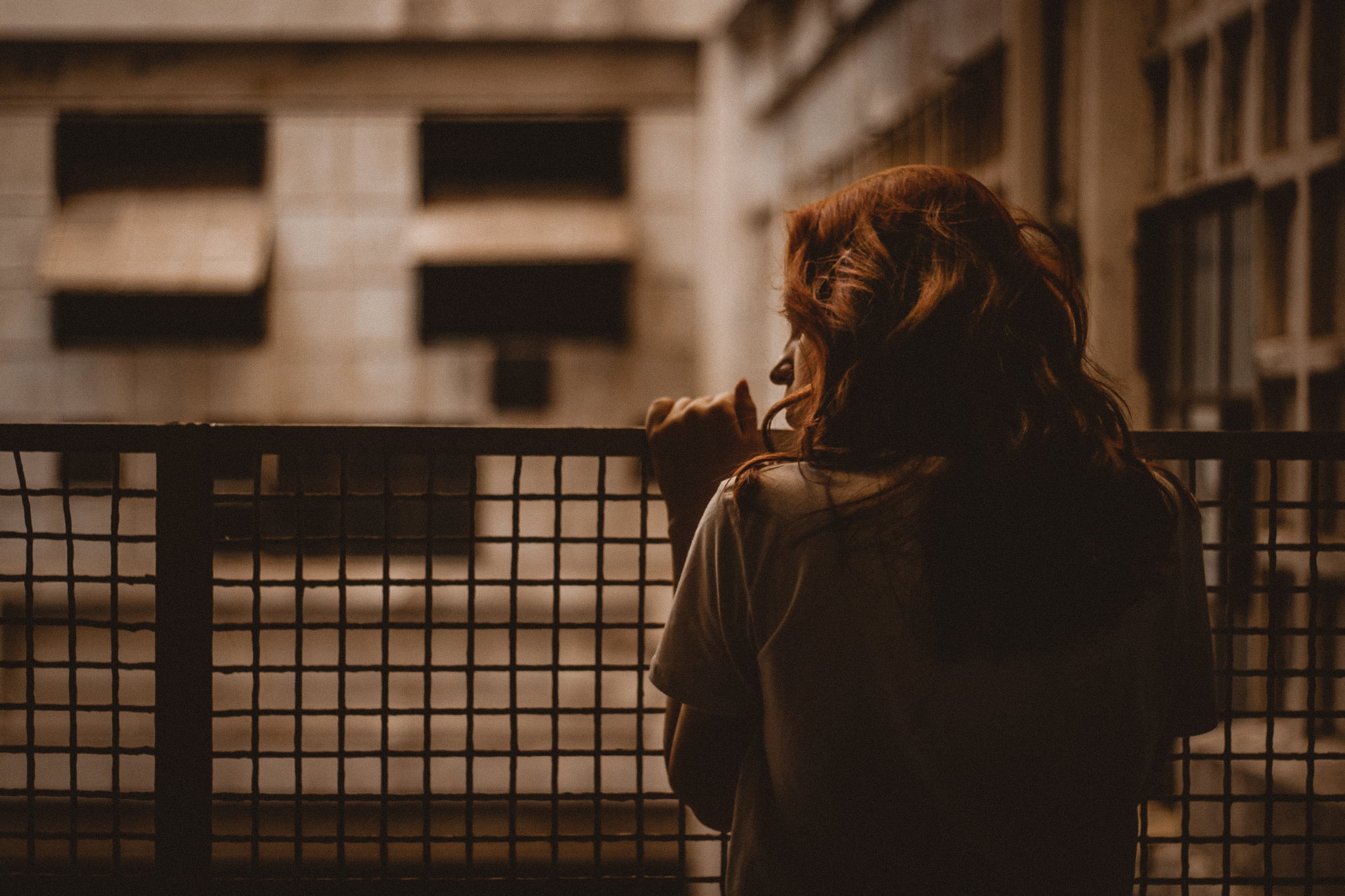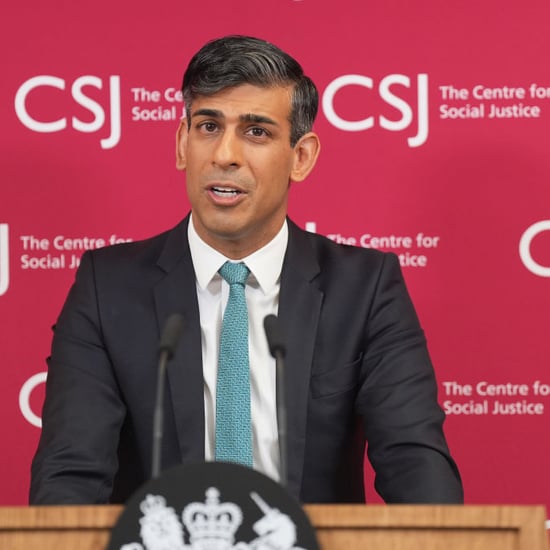What It's Like to Live With the Confession Compulsion of OCD
I Have OCD, and This Is What the "Confession" Compulsion Feels Like

When I was 11, I woke up in the middle of the night after having a dream that the world was ending. The details are fuzzy, as they were then, but I knew that it was somehow my fault. I ran downstairs in the dead of night, heading for the front door. I have no idea where I would have gone, but thankfully I stopped when I heard my mom say "Nay?" from the top of the stairs. I ran back up the stairs to her, grabbed her hands tightly, and said very seriously, "The world is ending, and it's all my fault." Then I threw up. That was the beginning; I just didn't know it yet.
In the days that followed, my body filled with an emotion I could only describe as guilt. I couldn't manage to think of anything I had done recently that would push me to feel so guilty, so I started racking my brain for past misdeeds. Finally, something popped into my head. I had hosted a Halloween party a few months before, and my friends and I had visited a chat room while using my mom's work computer. I knew I wasn't supposed to do that, so I decided that must be the reason I was feeling bad.
I knew that by confessing to a priest you were absolved of your sins, but I didn't have a priest on hand, so I did the next best thing, which was to confess to my mom. I sat her down very seriously and said, "I have something to tell you." It wasn't until 16 years later that I would learn that "confessing" is a symptom of obsessive-compulsive disorder, which I was diagnosed with at age 27.
I immediately felt better after confessing to my mom. However, an hour or two later, the guilty feeling was back. When I thought of something to confess, I immediately found my mom and told her what I had done. As an 11-year-old, there wasn't anything I was doing that truly warranted confessing, so she would lightly chastise me, and I would feel better for a while, only to be plagued later on when I was alone with my thoughts.
This continued on and off for years, my brain deeming certain things "bad" and other things "good." If I had done a "bad" thing, I would need to tell my mom. The longer I waited the worse I felt. This did not make me a popular person to invite to seventh-grade sleepovers.
I felt like the anxiety was taking root inside my body and I needed to get it out. I felt guilty, and I didn't know why.
I thought the confessing had gone away for good, because I didn't experience any symptoms for more than 10 years. But a few years ago, after a night of heavy drinking and partying, I experienced a heavy dose of anxiety. Not the typical anxiety I battled on a weekly basis, but something different. It felt like my body was burning from my toes up, and I felt physically unable to move. My hands were sweaty, I had a huge lump in my throat and a pit in my stomach, and I felt like I was going to throw up. I felt like the anxiety was taking root inside my body and I needed to get it out. I felt guilty, and I didn't know why.
So I did what 11-year-old Renee would do and started searching for any reason I could be feeling this way. When I came up with something, I called my mom and told her. When that didn't work, I tried telling my boyfriend. That gave me the relief I needed.
The cycle I began in 2001 had started all over again, just with a different person. Confessing to my boyfriend worked for a little while, but then it stopped working altogether.
I turned to my therapist and my psychiatrist, but I couldn't shake the anxiety and guilt I was feeling. Thinking it could be related to bipolar disorder, my psychiatrist referred me to a specialist.
In the week leading up to my appointment, I felt worse than ever. My anxiety was crippling, and my therapist had me taking anxiety medication three times a day just to ease the constant tension I was feeling. I couldn't work, I couldn't eat, and I could barely get out of bed. My mom came to stay with my boyfriend and me because they were both so worried about me. I was experiencing what felt like a mental breakdown, and it wasn't pretty.
On the day of my appointment, I walked into the specialist's office fully prepared to leave feeling no better. The second I mentioned confessing to her, she stopped me and said, "I think what you're experiencing is OCD." It wasn't until later — when I Googled "OCD confessing" and found pages and pages of people explaining experiencing situations exactly like mine — that I felt a huge weight lifted off my shoulders. I finally had an answer for what was wrong with me, which meant I could finally do something about it.
Being diagnosed with obsessive-compulsive disorder has been extremely complicated. In addition to "confessing," my specific brand of OCD takes the shape of obsessive intrusive thoughts. Intrusive thoughts are unwelcome thoughts that enter your head and cause distress. They are uncontrollable and difficult to push out, which usually leads to OCD sufferers trying to "neutralise" the thought by completing a compulsion.
According to the National Institute of Mental Health, "Obsessive-Compulsive Disorder (OCD) is a common, chronic, and long-lasting disorder in which a person has uncontrollable, reoccurring thoughts (obsessions) and/or behaviours (compulsions) that he or she feels the urge to repeat over and over." The NIMH website goes on to state that obsessions can manifest in different ways, such as, "fear of germs or contamination, unwanted forbidden or taboo thoughts, aggressive thoughts towards others or self," while compulsions can include "excessive cleaning and/or hand washing, ordering and arranging things in a particular, precise way, compulsive counting."
Being armed with the knowledge that I have OCD doesn't mean I have it all figured out.
When I learned what intrusive thoughts were, I immediately recognised them as what I had going through my mind any time my brain wasn't intently focussed on a specific task. My boyfriend had suggested I get tested for ADD, because he would often be in the midst of a conversation with me when it became blatantly apparent that I hadn't heard a word he had said. It wasn't that I wasn't paying attention; I was just battling the latest thought that popped into my head and turning it over and over in my brain.
Being armed with the knowledge that I have OCD doesn't mean I have it all figured out. OCD is a tricky beast. It often manifests itself in different forms that make it difficult for me to easily discern what's going on.
A little over a year ago, I was lying in bed and couldn't sleep. My skin felt itchy, and I didn't know why. I had recently read an article about adults needing eight hours of sleep, and every second I was awake was another second I wasn't getting the sleep I needed.
I decided to take another shower, thinking it might help. I rinsed off, turned off the shower, and grabbed a towel to dry off. I dried off my left arm, my right arm, my left leg, my right leg, then my back, and then my front. I put on a different pair of pajamas, got in bed, and immediately fell asleep. The next night, again I couldn't sleep. Remembering what had worked the night before, I got out of bed and began the same ritual: shower, towel off left arm, right arm, left leg, right leg, back, front. Put on a different pair of pajamas. Only this time it didn't work right away. Thinking I must have done something wrong, I got back up and showered for the third time that night. I completed the same ritual, drying off in the exact same way, and I grabbed my third pair of pajamas. That time, I was able to fall asleep.
But in the days, weeks, and months that followed, the ritual didn't always leave me feeling "right." Some nights, I showered eight times, exhausting myself and intensifying my frustration. When I told my therapist I thought I was experiencing insomnia, she helped me realise this behaviour was also related to my OCD.
Some nights, I showered eight times, exhausting myself and intensifying my frustration.
Figuring all of this out was reassuring, but it didn't fix everything. I started participating in ERP, or exposure response therapy, which helps OCD sufferers by slowly exposing them to the things they fear. Frankly, for OCD sufferers, ERP is terrifying to even think about. For me, the therapy meant acknowledging my thoughts or even saying them out loud, without trying to push them out of my brain. ERP required that I purposely not complete my rituals, allowing myself to stay up all night rather than take that second shower I so desperately felt I needed.
Participating in ERP has definitely helped, but it's a long process. I've had to start out with the obsessions and compulsions that scare me the least, and I'm still working my way up to the ones at the top of the list. I'm happy to share that I'm only showering once a night, and I'm sleeping just fine.
I walk a fine line every day: I utilise my OCD as a way to feel like I have control over my life, but I must avoid becoming a slave to my own thoughts. OCD affects every aspect of my life, like how I complete my work, when I have sex, when I take a shower, and how I clean the bathroom.
In some ways, I'm able to channel it for good. It's helped me be better at my job, and it definitely helps me keep my house clean. But in other ways, I have to be careful. I spend a lot of time in my own head, so learning how to navigate what goes on inside of it has been paramount to living the closest thing to a normal life that I can muster.
I know that when big changes occur in my life, I should expect my OCD to pop up, which makes it scary to think about the future. Getting married, getting pregnant, having my first child — these are all things I'm both equally excited and terrified about.
My OCD is far from fixed, but the important thing for me is that it is fixable. I may never truly be rid of it, but I can learn to live with it. I've made big changes in my life that have helped: I rarely drink, and it's even rarer that you'll actually see me drunk. I work out at least five days a week, and I try to eat a diet that doesn't consist solely of hot Cheetos and lemonade. I'm not in therapy, I'm not participating in ERP, and I am currently not on medication, although I do have a prescription for Xanax, which I take if I'm having a massive panic attack or really bad anxiety, which I haven't had in a long time. All in all, I'm doing OK. I've learned to listen to what I need, and right now what I need is a break.







